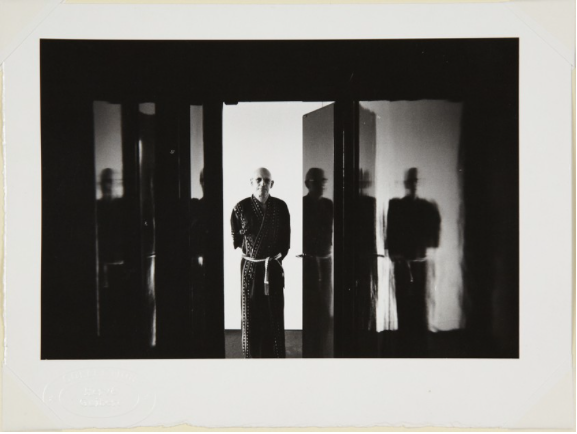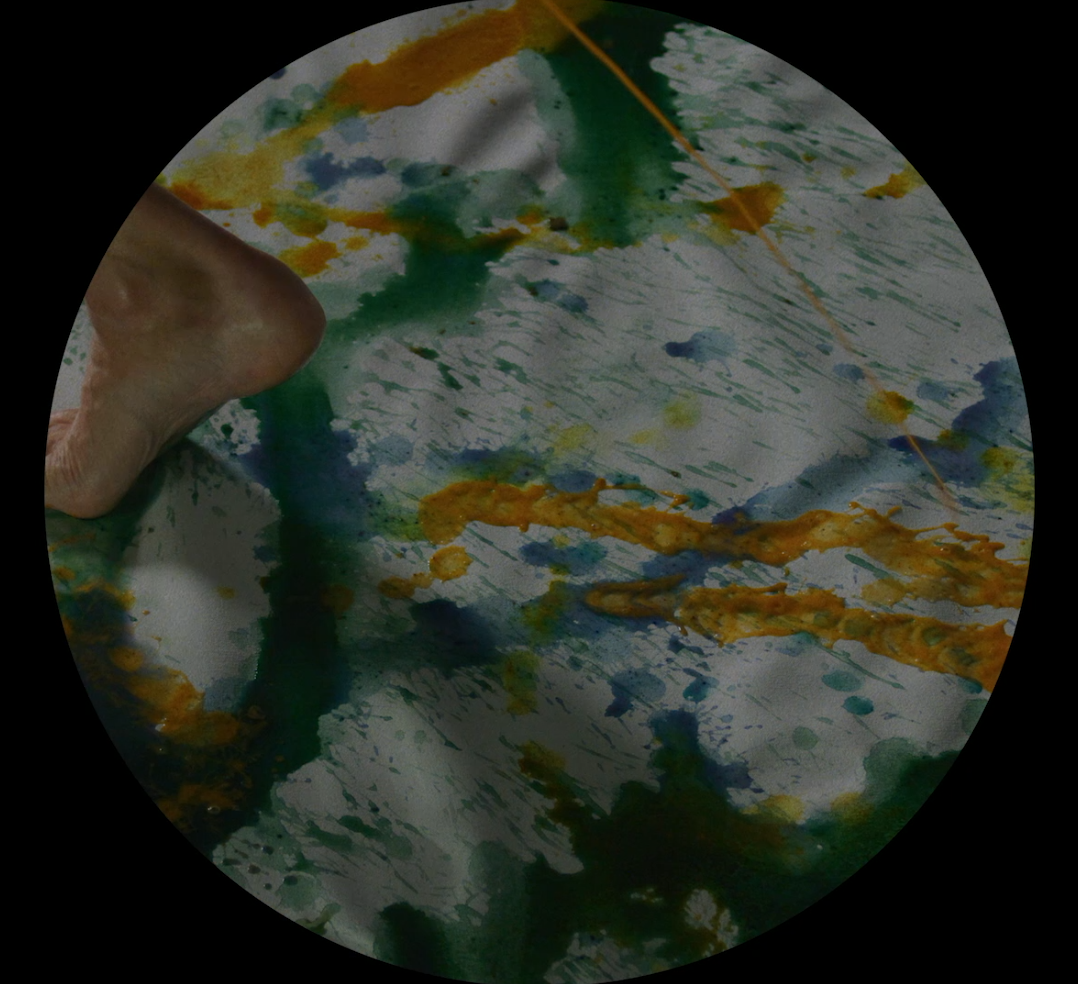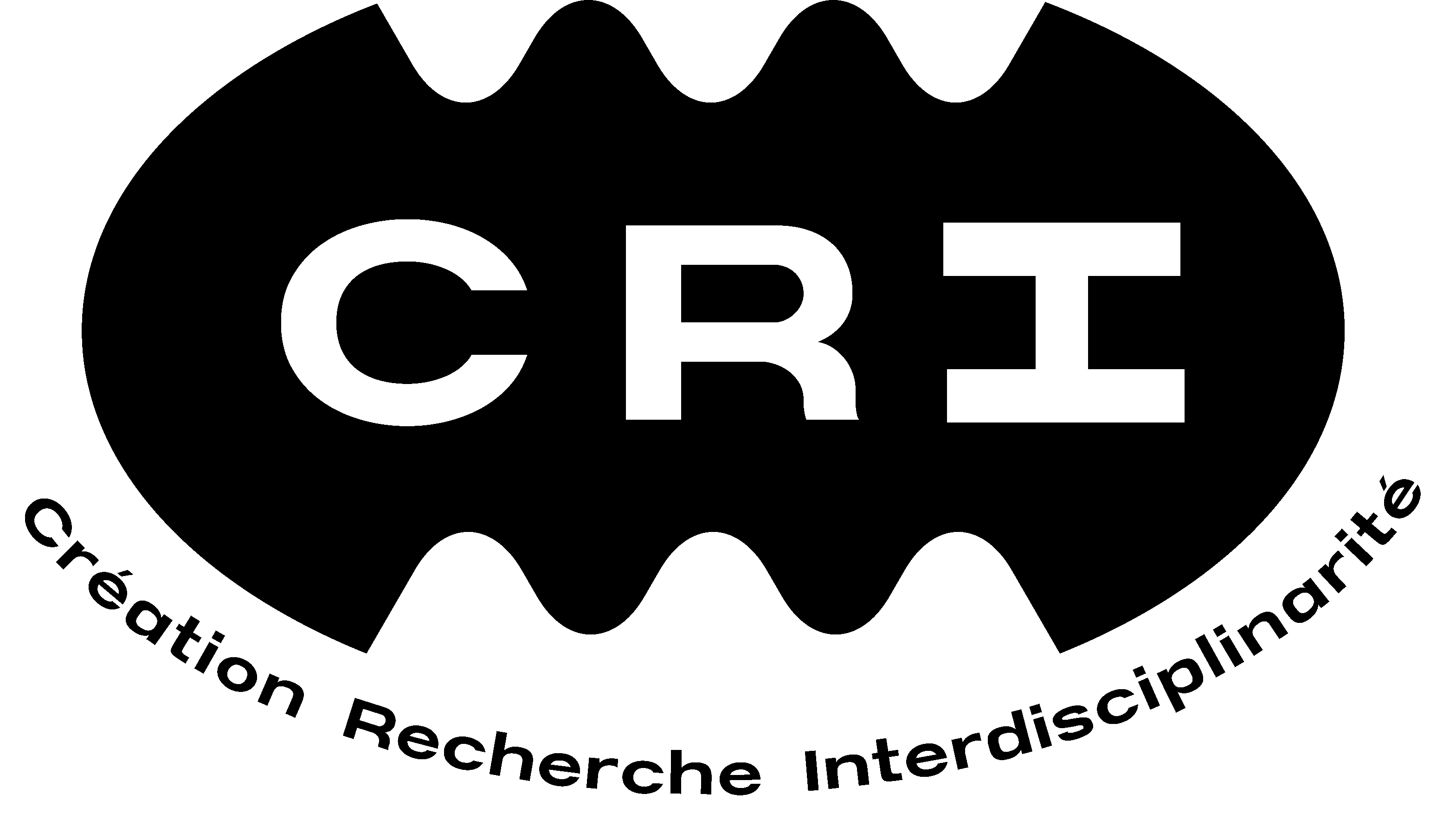DAY 01. Cadeau
![]()
For Michel Foucault, friendship was "the sum of all the things by which we can please each other." He was friend with the writer Hervé Guibert, who inspired him to create a pseudo-fictional character, one of the protagonists of his autobiographical stories: "Some nights, from my balcony at 203 Rue du Bac, I would see him leave his house in a black leather jacket, with chains and metal rings on the shoulder pads, [...] he would cross Paris to go to a bar in the 12th district, Le Keller, where he would collect his victims."
But Guibert's texts do not only mention Foucault's hard side, but also a more touching one, as in the photograph Guibert took of the philosopher in a silk bathrobe on the threshold of his apartment, or when he wrote him a letter about his impressions of a handsome neighbour: "I want to tell you about the pleasure I find in watching, without moving from my desk, a boy who comes every day at the same hour and leans against a window on the rue d'Alleray. […], he lets himself slide down onto the balcony floor, his head rolling from one arm to the other [...], and goes in the search of extremely strong dreams, intense, exhausting, which leave him in a great dejection."
This admiring voyeurism of Foucault's was particularly pronounced for many of us during the successive periods of confinement that this film attempts to show.
Pour Michel Foucault l’amitié était "la somme de toutes les choses à travers lesquelles l’un à l’autre, on peut se faire plaisir." Il était lié en amitié avec l’écrivain Hervé Guibert, qui s’en inspirait pour construire un personnage pseudo fictionnel, l’un des protagonistes de ses récits autobiographiques : "Certaines nuits, depuis mon balcon au 203 rue du Bac, je le voyais ressortir de chez lui, en blouson de cuir noir, avec des chaînes et des anneaux de métal sur les épaulettes, [...] il traversait Paris pour se rendre dans un bar du XIIe arrondissement, Le Keller, où il levait des victimes."
Mais c’est ne pas seulement l’aspect hard de Foucault que Guibert mentionne dans ses textes, mais une personne plus attendrissante, comme on le voit sur la photographie du philosophe vêtu d’un peignoir en soie au seuil de son appartement que Guibert lui avait prise, ou bien quand il lui écrit une lettre de ses impressions sur un beau voisin : " J’avais envie de te raconter le plaisir que je trouve à regarder, sans bouger de ma table, un garçon qui chaque jour vient à la même heure s’accouder à une fenêtre de la rue d’Alleray. [...] , il se laisse glisser sur l’appui de son balcon, sa tête roulant d’un bras à l’autre [...] , va y chercher des rêves extrêmement forts, intenses, épuisants, qui le laissent dans un grand abattement."
Ce voyeurisme admiratif de Foucault c’est particulièrement accentué pour beaucoup d’entre nous pendant les périodes successives de confinement dont ce film essaie de montrer.
![]() Michel Foucault, 1981. Photograph by Herve Guibert, 1955–1991.
Michel Foucault, 1981. Photograph by Herve Guibert, 1955–1991.
Gelatin silver print 1995-234
© Estate of Herve Guibert
For Michel Foucault, friendship was "the sum of all the things by which we can please each other." He was friend with the writer Hervé Guibert, who inspired him to create a pseudo-fictional character, one of the protagonists of his autobiographical stories: "Some nights, from my balcony at 203 Rue du Bac, I would see him leave his house in a black leather jacket, with chains and metal rings on the shoulder pads, [...] he would cross Paris to go to a bar in the 12th district, Le Keller, where he would collect his victims."
But Guibert's texts do not only mention Foucault's hard side, but also a more touching one, as in the photograph Guibert took of the philosopher in a silk bathrobe on the threshold of his apartment, or when he wrote him a letter about his impressions of a handsome neighbour: "I want to tell you about the pleasure I find in watching, without moving from my desk, a boy who comes every day at the same hour and leans against a window on the rue d'Alleray. […], he lets himself slide down onto the balcony floor, his head rolling from one arm to the other [...], and goes in the search of extremely strong dreams, intense, exhausting, which leave him in a great dejection."
This admiring voyeurism of Foucault's was particularly pronounced for many of us during the successive periods of confinement that this film attempts to show.
But Guibert's texts do not only mention Foucault's hard side, but also a more touching one, as in the photograph Guibert took of the philosopher in a silk bathrobe on the threshold of his apartment, or when he wrote him a letter about his impressions of a handsome neighbour: "I want to tell you about the pleasure I find in watching, without moving from my desk, a boy who comes every day at the same hour and leans against a window on the rue d'Alleray. […], he lets himself slide down onto the balcony floor, his head rolling from one arm to the other [...], and goes in the search of extremely strong dreams, intense, exhausting, which leave him in a great dejection."
This admiring voyeurism of Foucault's was particularly pronounced for many of us during the successive periods of confinement that this film attempts to show.
Pour Michel Foucault l’amitié était "la somme de toutes les choses à travers lesquelles l’un à l’autre, on peut se faire plaisir." Il était lié en amitié avec l’écrivain Hervé Guibert, qui s’en inspirait pour construire un personnage pseudo fictionnel, l’un des protagonistes de ses récits autobiographiques : "Certaines nuits, depuis mon balcon au 203 rue du Bac, je le voyais ressortir de chez lui, en blouson de cuir noir, avec des chaînes et des anneaux de métal sur les épaulettes, [...] il traversait Paris pour se rendre dans un bar du XIIe arrondissement, Le Keller, où il levait des victimes."
Mais c’est ne pas seulement l’aspect hard de Foucault que Guibert mentionne dans ses textes, mais une personne plus attendrissante, comme on le voit sur la photographie du philosophe vêtu d’un peignoir en soie au seuil de son appartement que Guibert lui avait prise, ou bien quand il lui écrit une lettre de ses impressions sur un beau voisin : " J’avais envie de te raconter le plaisir que je trouve à regarder, sans bouger de ma table, un garçon qui chaque jour vient à la même heure s’accouder à une fenêtre de la rue d’Alleray. [...] , il se laisse glisser sur l’appui de son balcon, sa tête roulant d’un bras à l’autre [...] , va y chercher des rêves extrêmement forts, intenses, épuisants, qui le laissent dans un grand abattement."
Ce voyeurisme admiratif de Foucault c’est particulièrement accentué pour beaucoup d’entre nous pendant les périodes successives de confinement dont ce film essaie de montrer.
Mais c’est ne pas seulement l’aspect hard de Foucault que Guibert mentionne dans ses textes, mais une personne plus attendrissante, comme on le voit sur la photographie du philosophe vêtu d’un peignoir en soie au seuil de son appartement que Guibert lui avait prise, ou bien quand il lui écrit une lettre de ses impressions sur un beau voisin : " J’avais envie de te raconter le plaisir que je trouve à regarder, sans bouger de ma table, un garçon qui chaque jour vient à la même heure s’accouder à une fenêtre de la rue d’Alleray. [...] , il se laisse glisser sur l’appui de son balcon, sa tête roulant d’un bras à l’autre [...] , va y chercher des rêves extrêmement forts, intenses, épuisants, qui le laissent dans un grand abattement."
Ce voyeurisme admiratif de Foucault c’est particulièrement accentué pour beaucoup d’entre nous pendant les périodes successives de confinement dont ce film essaie de montrer.
What is THE_DECAMERON_ PROJECT?
COVID19 profoundly undermined our open-ended relationship with the world. The central social ritual of live culture -as we understood it- was for an extended time beyond our reach, only to return under radically altered or restrictive conditions. The pandemic triggered an acceleration in technological reconception of creative media such as plays, exhibitions and concerts, beyond their pre-COVID pure ‘live’ forms.
Emerging from another plague, the 14th century Black Death, Giovanni Boccaccio’s Decameron presented readers with models of pre, mid and post-plague societal perceptions and norms. Following its antecedent, The_Decameron_Project begins within the confinement period, touching on the recent memories and reflections on now lost modalities of life. Then, as an imagined perpetual participative project which transcends the period(s) of confinement and enters a ‘new normality’ era, it seeks to grow and map the emergence of new ritual norms as they manifest over the course of ten days (from the Greek deca=ten, meron=days).
DAY 0. Building Narratologies in Pandemic Times
Peer-reviewed Video Article by Mauricio Carrasco and Daniel Zea. 2020. Ensemble Vortex.
As a first sketch of The_Decameron_Project, this video article attempts to deal on a daily basis with what Barthes called an ‘untimely contemporaneity’. That is, the shared sense of living in a world of continuous and exponential acceleration, beyond our reach.
How to cite:
Abrahams, A., Pinheiro, D., Carrasco, M., Zea, D., La Porta, T., de Manuel, A., … Varin, M. (2020). Embodiment and Social Distancing: Projects. Journal of Embodied Research, 3(2), 4 (27:52). DOI: http://doi.org/10.16995/jer.67
DAY 01. Cadeau

For Michel Foucault, friendship was "the sum of all the things by which we can please each other." He was friend with the writer Hervé Guibert, who inspired him to create a pseudo-fictional character, one of the protagonists of his autobiographical stories: "Some nights, from my balcony at 203 Rue du Bac, I would see him leave his house in a black leather jacket, with chains and metal rings on the shoulder pads, [...] he would cross Paris to go to a bar in the 12th district, Le Keller, where he would collect his victims."
But Guibert's texts do not only mention Foucault's hard side, but also a more touching one, as in the photograph Guibert took of the philosopher in a silk bathrobe on the threshold of his apartment, or when he wrote him a letter about his impressions of a handsome neighbour: "I want to tell you about the pleasure I find in watching, without moving from my desk, a boy who comes every day at the same hour and leans against a window on the rue d'Alleray. […], he lets himself slide down onto the balcony floor, his head rolling from one arm to the other [...], and goes in the search of extremely strong dreams, intense, exhausting, which leave him in a great dejection."
This admiring voyeurism of Foucault's was particularly pronounced for many of us during the successive periods of confinement that this film attempts to show.
But Guibert's texts do not only mention Foucault's hard side, but also a more touching one, as in the photograph Guibert took of the philosopher in a silk bathrobe on the threshold of his apartment, or when he wrote him a letter about his impressions of a handsome neighbour: "I want to tell you about the pleasure I find in watching, without moving from my desk, a boy who comes every day at the same hour and leans against a window on the rue d'Alleray. […], he lets himself slide down onto the balcony floor, his head rolling from one arm to the other [...], and goes in the search of extremely strong dreams, intense, exhausting, which leave him in a great dejection."
This admiring voyeurism of Foucault's was particularly pronounced for many of us during the successive periods of confinement that this film attempts to show.
Pour Michel Foucault l’amitié était "la somme de toutes les choses à travers lesquelles l’un à l’autre, on peut se faire plaisir." Il était lié en amitié avec l’écrivain Hervé Guibert, qui s’en inspirait pour construire un personnage pseudo fictionnel, l’un des protagonistes de ses récits autobiographiques : "Certaines nuits, depuis mon balcon au 203 rue du Bac, je le voyais ressortir de chez lui, en blouson de cuir noir, avec des chaînes et des anneaux de métal sur les épaulettes, [...] il traversait Paris pour se rendre dans un bar du XIIe arrondissement, Le Keller, où il levait des victimes."
Mais c’est ne pas seulement l’aspect hard de Foucault que Guibert mentionne dans ses textes, mais une personne plus attendrissante, comme on le voit sur la photographie du philosophe vêtu d’un peignoir en soie au seuil de son appartement que Guibert lui avait prise, ou bien quand il lui écrit une lettre de ses impressions sur un beau voisin : " J’avais envie de te raconter le plaisir que je trouve à regarder, sans bouger de ma table, un garçon qui chaque jour vient à la même heure s’accouder à une fenêtre de la rue d’Alleray. [...] , il se laisse glisser sur l’appui de son balcon, sa tête roulant d’un bras à l’autre [...] , va y chercher des rêves extrêmement forts, intenses, épuisants, qui le laissent dans un grand abattement."
Ce voyeurisme admiratif de Foucault c’est particulièrement accentué pour beaucoup d’entre nous pendant les périodes successives de confinement dont ce film essaie de montrer.
Mais c’est ne pas seulement l’aspect hard de Foucault que Guibert mentionne dans ses textes, mais une personne plus attendrissante, comme on le voit sur la photographie du philosophe vêtu d’un peignoir en soie au seuil de son appartement que Guibert lui avait prise, ou bien quand il lui écrit une lettre de ses impressions sur un beau voisin : " J’avais envie de te raconter le plaisir que je trouve à regarder, sans bouger de ma table, un garçon qui chaque jour vient à la même heure s’accouder à une fenêtre de la rue d’Alleray. [...] , il se laisse glisser sur l’appui de son balcon, sa tête roulant d’un bras à l’autre [...] , va y chercher des rêves extrêmement forts, intenses, épuisants, qui le laissent dans un grand abattement."
Ce voyeurisme admiratif de Foucault c’est particulièrement accentué pour beaucoup d’entre nous pendant les périodes successives de confinement dont ce film essaie de montrer.
 Michel Foucault, 1981. Photograph by Herve Guibert, 1955–1991.
Michel Foucault, 1981. Photograph by Herve Guibert, 1955–1991.Gelatin silver print 1995-234
© Estate of Herve Guibert
DAY 02. The Love Letters?

The Love Letters? (2018) by Daniel Zea.
For two performers, two webcams, two computers running face tracking algorithms, video and electronics
Two persons face to face in front of their computers. Each movement and facial gesture are tracked, recognized and converted into control signals. A blink of an eye, a moving gaze or a grimace generate music and text. The emotions evoked by faces are in constant contrast with aleatory algorithms that produce the digital artistic outputs. What can we possibly understand this multilayered dialogue? How transcendental can be the communication of two faces interfaced by a network of machines? What are the love letters that might result from computer algorithms?
Day 2 (Coda)
Autorretrato (work in progress) (2023) by Daniel Zea.
For performer, facial recognition, 3D animations and electronic sounds

“If you don't love yourself, how in the hell you gonna love somebody else?”
RuPaul Charles
RuPaul Charles
Day 03. Altar

Altar (2023) is a divine intervention of queer crucifixion inspired by Francis Bacon’s triptych painting (1944 – 1986). The film draws parallels with Bacon’s use of life and death, beauty and violence, civilisation and barbarism.
In Altar, I perform a painterly choreographic expression atop a large-scale canvas using my anus as a brush, referencing the blood of Christ. I read the rectum paint as ‘a font of creation’, an expression of deep privacy, a physicality we are conditioned from childhood to reject. In attending a crucifixion, one witnesses an act of ultimate judgement. In Altar I challenge the act of witnessing -in the film my fragmented presence becomes the omnipotent judge and the ultimately judged. Amplifying homosexuality and the queer acts within contemporary performance art and film, Altar explores queer expression throughout history as a reliable signifier of the ever–changing avant–garde.
Phillip Adams



